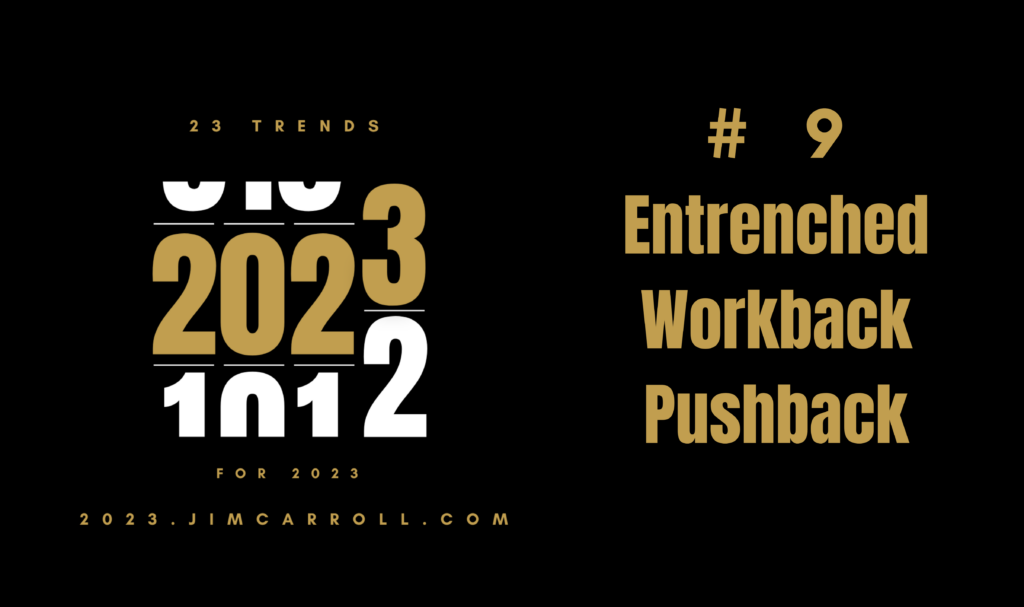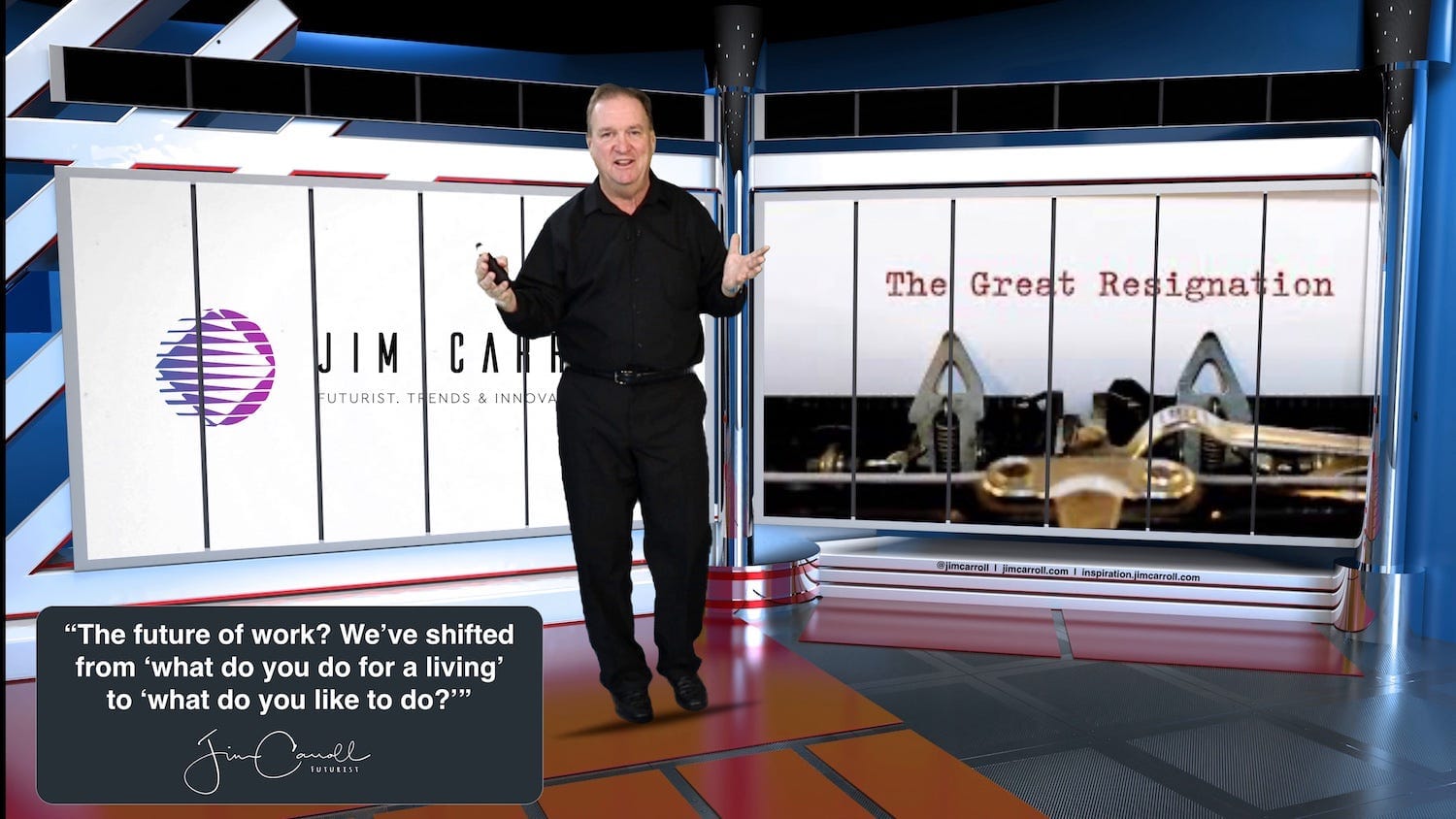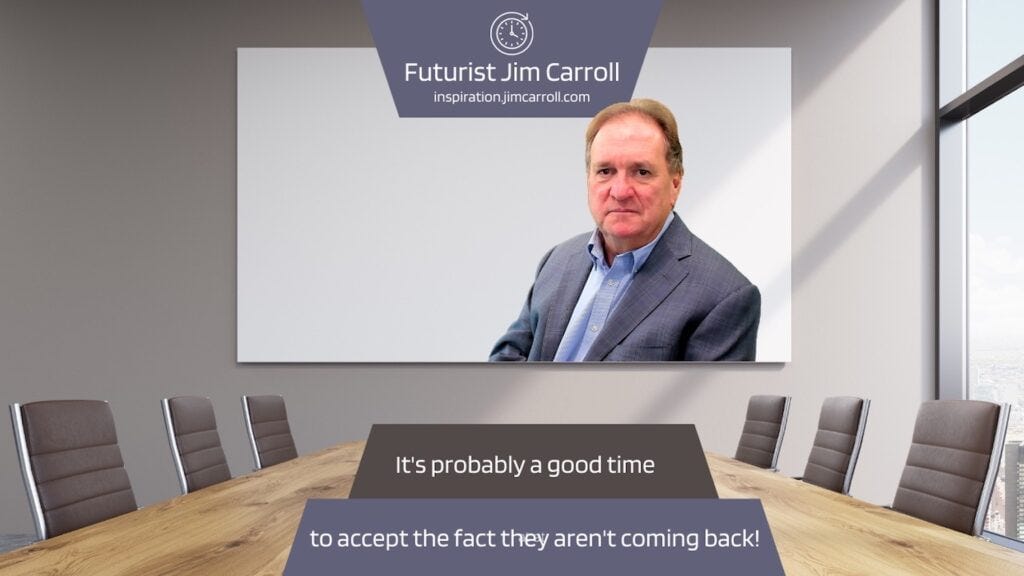It's all about trying to get people back to the office!
But many of them don't want to come back - freedom, once attained, is always fought hard for. That's why trend #9 of my '23 Trends for 2023' - the issues that executives and companies need to watch for - is Entrenched Workback Pushback.

Workback pushback? I've been using that phrase for close to two years, to suggest that people won't want to 'return to work.' I'm not seeing the trend well established - entrenched, so to speak. This has a pretty significant impact on organizations going forward - because we aren't going back to where we were. We are only going to where we will be - a massively distributed, entirely weird workforce!
One year ago today I wrote this into my daily post: “The future of work? We’ve shifted from ‘what do you do for a living' to ‘what do you like to do?’” - Futurist Jim Carroll

That's the essence of trend, right there. I'd encourage you to read the whole post because the global pandemic simply accelerated a trend that was already well underway: people who work at home realize that there is more to a job than the job.
Here's what I wrote at the time:
The 'Great Resignation?' It too is not a new trend - in fact, I've been speaking about it since at least 2004, when I first came up with my 'snowboard dude' story, based on observations about the future of the workforce. It tells the story of a young fellow they were trying to hire for a full-time engineering position - and he turned them down because their structured office hours and corporate culture would interfere with his ability to hit the fresh powder on the hill.
In a post I wrote years before that (included in the post above), I observed:
And that comes to the heart of the question asked by the CEO: ‘what’s with these “kids”’ is that if they can’t find a career that provides an adequate fit between what they do for fun (“boarding”) and what they do for a living (“designing”), they’ll turn down the opportunity.
Last May, I was in Belgium, speaking at a conference on the workforce. An industry publication later reported my views: you can see the article here.
"As leadership discussions take place about adopting full-time remote, hybrid, or just back-to-the-office models, Carroll sees a fundamental shift in what the younger generation wants. “They have no desire to go back into the office because they’ve tasted freedom. They have no desire to be part of the traditional workforce. We have leaders who want us to go back to 2019. That is just not going to happen.”
“The younger generation has no desire to go back into the office because they’ve tasted freedom.”
“I think the final result will have to be some type of hybrid in lieu of the workback pushback”, Carroll continued. “I think the truth is found in the snowboarder, who gets up every morning and goes for a run. Then puts in four solid hours, goes for a walk during the afternoon — and puts in another solid three hours. That’s a new reality. Meetings and events can be used as corporate team-building exercises, but the corporate culture will have changed — and evolved.”
“It’s all about contract work, part-time relationships, and external partnerships. This is not a new trend.”
In conclusion, Carroll recalls being stunned when he read a New York Times article in 1987, which predicted a future wherein organizations would become smaller and become something fundamentally different. “Fast forward to today’s economy: organizations are going to go forward with a smaller employee footprint”, Carroll continued. “They’re expanding and contracting as necessary. It’s all about contract work, part-time relationships, and external partnerships. This is not a new trend.”
The key thing about the return-to-work 'trend?'
It's a desire, not a trend.
I think vast numbers of them don't plan on coming back, at least on any sort of full-time basis, and the corporate world has to align with the increasing likelihood of that reality and plan accordingly.
And if you consider that in the cold hard light of trend #8: Knowledge Velocity, where it is increasingly difficult to get the skills you need, you'll come to realize that they are in control.
Not you.
Futurist Jim Carroll has been working at home since 1989. He has long understood the personal power in a career in which his day is defined by the reclamation of vast amounts of personal time.

